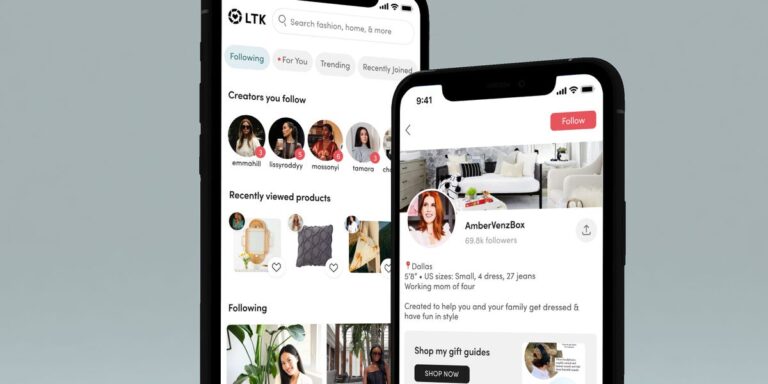Creator-commerce company LTK thinks platforms like YouTube and TikTok are at a major disadvantage as they push into affiliate marketing.
These platforms are betting big on social shopping and have introduced a suite of in-app shopping tools and features for creators and customers. They're putting pressure on the dozens of creator-commerce and affiliate-marketing upstarts and programs that work with influencers and brands to drive sales, from Amazon's influencer program to companies like MagicLinks, ShopMy, and LTK.
Allison Yazdian, SVP of creator growth and success at LTK, told Business Insider that her company has a leg up over the tech giants entering affiliate marketing because LTK isn't beholden to a single platform, format, or brand.
“The reason why LTK has gotten to be so successful and will continue to be is because we are agnostic,” Yazdian said. “A creator can showcase their whole life. It's not split up across platforms.”
LTK, formally known as RewardStyle and LiketoKnow.it, is an affiliate-marketing and creator-commerce platform for influencers. A creator can make money on LTK in several ways, from affiliate commissions to brand collaborations. The platform gives creators the ability to build storefronts for their followers to shop from, among other tools and features. The Dallas-based company was last valued at $2 billion in 2021 when it Raised $300 million from SoftBank.
LTK's platform lets creators share shoppable photos and videos. Screenshot/LTK website
Yazdian pointed out that tech companies like Meta have retreated from social shopping as another sign that platforms have struggled with this business.
While TikTok Shop has quickly gained success in social shopping since its US launch last year, its e-commerce push came as other platforms like Instagram pulled back on native-shopping features.
YouTube's affiliate program, meanwhile, has struggled to gain widespread use among creators because they are either not familiar with it or it offers nothing different from an affiliate company they already use.
“You see these platforms come and go,” Yazdian said. “You need a place where regardless of where people are consuming your content, they know they can find you.”
In 2021, YouTube quietly tested its affiliate program with a small group of creators. Now, the platform offers a variety of shopping tools, including an affiliate-marketing program that pays creators commissions for the sales they drive through clickable affiliate links. It's betting on its integrated user experience to win over creators and shoppers; viewers can see products and prices directly below a YouTube video without having to search through the video's description, where outside links are placed.
Still, Yazdian said creators want to have all their shopping links in one place. Retailer-specific affiliate programs like those through Target or Walmart are also too restrictive because they offer fewer products to plug, she said.
“You don't want to be held up as a retailer,” Yazdian said. “You want it to be your full picture.”
LTK has been introducing features to lure creators from rival affiliate-marketing programs
LTK has launched a number of features to directly ward off its rivals.
Followers can visit a creator's page, LTK Shop, which displays links to the products they recommend. The shop displays a feed of shoppable posts, from photos and short vertical videos, similar to an Instagram profile. A feature called Collections lets creators group similar products together in one folder or organize links by a certain category.
LTK also offers several tools tied to specific platforms to help creators move their followers to their LTK storefronts. Recently, the company launched a direct-messaging tool that lets creators automatically message their followers on Instagram with an LTK product link.
“LTK is a destination,” Yazdian said. “We see creators saying things like, 'You can always check out my LTK,' and these followers don't go to a retail site, they go to their favorite creator's storefront on LTK, and they are shopping their looks.”


